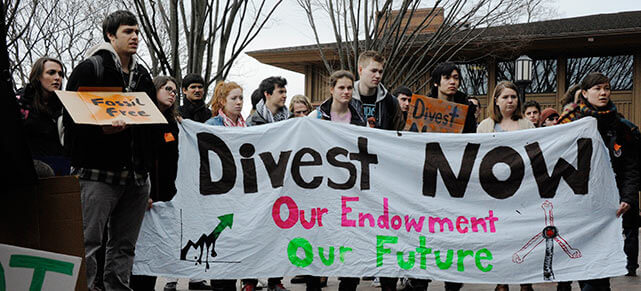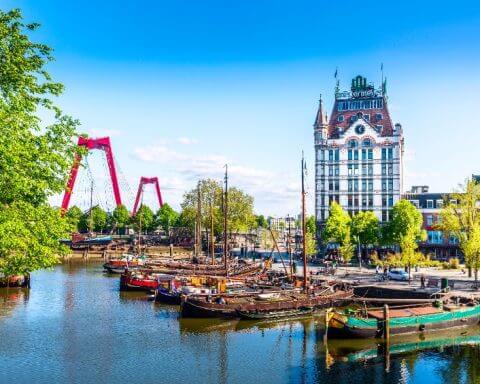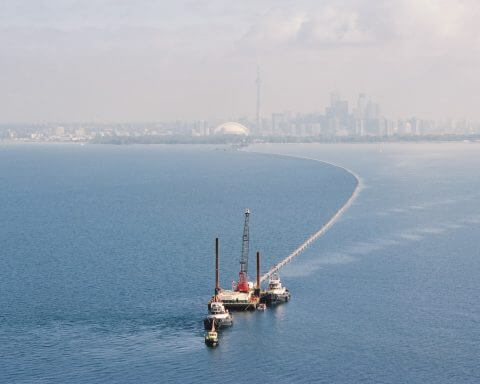Polluter pays
Andra AP-fonden (AP2), a Swedish state fund with €28.8 billion in assets under management says it will divest its funds from 20 fossil fuel companies worth about €91.5 million. The decision comes after a “comprehensive risk analysis” of the fund’s holdings. “By not investing in a number of companies, we are reducing our exposure to risk constituted by fossil-fuel based energy,” Eva Halvarsson, AP2’s chief executive told Responsible Investor.
Divestment has been all the rage in the United Kingdom lately. The University of Glasgow voted to divest its entire £128m endowment from fossil fuel companies, as have Oxford’s city council and the British Medical Association. Last week, Lego also decided to end its co-branding agreement with Shell Oil, meaning children will no longer fill up their toy cars at Shell gas stations.
Naomi Klein put all of this into perspective for the Guardian last Friday. She explained that although oil and gas companies likely won’t be hurt by divestment, institutional divestment does send a clear message that fossil fuel profits are illegitimate. Divestment “brings us a step closer to the principle that has been sorely missing from the collective climate response so far: the polluter pays,” she says.
But Corporate Knights’ own Ashley Renders pointed out last week that the relationship between money and emissions is not always that simple. Comparing the GDPs of countries in the Sustainable Asia Scorecard to their emissions shows that some countries are facing the double burden of low-value economies that produce a high amount of carbon emissions. The cash-strapped countries will almost certainly have a harder time adapting to climate change than countries, such as Japan, which have high-value, low-carbon economies.
Watered down drinks
Diageo, the world’s largest spirits company, is aiming to improve its water efficiency by 30 percent from 2007 levels by next year. Water is the most challenging climate-related issue for the alcoholic beverage industry, David Cutter, president of global supply and procurement told the Reuters Global Climate Change Summit in London last week. The company is facing internal and external pressure to improve its water management: Twenty-three of Diageo’s production sites are located in areas where water demand exceeds supply. The company is also being pressured by consumers and large retailers, such as Wal-Mart, to provide information on their water usage and carbon emissions, Diageo’s head of environment told Reuters.
Sustainable Asia
Our lead analyst, Michael Yow, gave us his perspective on the Corporate Knights 2014 Sustainable Asia Scorecard. Asia is home to some of the world’s fastest growing economies, but such rapid developing often comes with environmental and social costs, he said. After assessing 50 countries with a number of quantitative indicators, the ranking shows which Asian countries are balancing economic, social and environmental prosperity. Yow says the scorecard is useful for policymakers and investors alike, with an opportunity to benchmark best practices and to assess strengths and weaknesses in the region.
Modern Slavery Bill
Big businesses in the U.K. will soon be required to report annually on their efforts to eliminate slavery from their supply chains. The rule will be included in the Modern Slavery Bill, which is currently working its way through Parliament, Home Office Minister Karen Bradley announced last week. A report published by the Salvation Army last Monday says that the organization has seen a 62 per cent rise in human trafficking cases, with labour exploitation exceeding the number of sexual exploitation cases for the first time. The rule will apply to all businesses, regardless of what it products or services it supplies, making it the strongest of its kind in the world.
City dwellers
A report published today by a new think tank called City Observatory shows that Denver, San Diego, Nashville, Salt Lake City and Portland, Ore. are attracting more college graduates than New York, Washington and San Francisco. The report also shows that young, college-educated people are driving urban densification, as the number of 25 to 34 year-olds with college degrees living within three miles of a city centre has increased 37 per cent since 2000.
- CK Staff
- CK Staff
- CK Staff
- CK Staff
- CK Staff
- CK Staff
- CK Staff
- CK Staff
- CK Staff
- CK Staff
- CK Staff
- CK Staff
- CK Staff
- CK Staff
- CK Staff
- CK Staff
- CK Staff
- CK Staff
- CK Staff
- CK Staff
- CK Staff
- CK Staff
- CK Staff
- CK Staff
- CK Staff
- CK Staff
- CK Staff
- CK Staff
- CK Staff
- CK Staff
- CK Staff
- CK Staff
- CK Staff
- CK Staff
- CK Staff
- CK Staff
- CK Staff
- CK Staff
- CK Staff
- CK Staff
- CK Staff
- CK Staff
- CK Staff
- CK Staff
- CK Staff
- CK Staff
- CK Staff
- CK Staff
- CK Staff
- CK Staff
- CK Staff
- CK Staff
- CK Staff
- CK Staff
- CK Staff
- CK Staff
- CK Staff
- CK Staff
- CK Staff
- CK Staff
- CK Staff
- CK Staff
- CK Staff
- CK Staff
- CK Staff
- CK Staff
- CK Staff
- CK Staff
- CK Staff
- CK Staff
- CK Staff
- CK Staff
- CK Staff
- CK Staff
- CK Staff
- CK Staff
- CK Staff
- CK Staff
- CK Staff
- CK Staff
- CK Staff
- CK Staff
- CK Staff
- CK Staff
- CK Staff
- CK Staff
- CK Staff
- CK Staff
- CK Staff
- CK Staff
- CK Staff
- CK Staff
- CK Staff
- CK Staff
- CK Staff
- CK Staff
- CK Staff
- CK Staff
- CK Staff
- CK Staff
- CK Staff
- CK Staff
- CK Staff
- CK Staff
- CK Staff
- CK Staff
- CK Staff
- CK Staff
- CK Staff
- CK Staff
- CK Staff
- CK Staff
- CK Staff
- CK Staff
- CK Staff
- CK Staff
- CK Staff
- CK Staff
- CK Staff
- CK Staff
- CK Staff
- CK Staff
- CK Staff
- CK Staff
- CK Staff
- CK Staff
- CK Staff
- CK Staff
- CK Staff
- CK Staff
- CK Staff
- CK Staff
- CK Staff
- CK Staff
- CK Staff
- CK Staff
- CK Staff
- CK Staff
- CK Staff
- CK Staff
- CK Staff
- CK Staff
- CK Staff
- CK Staff
- CK Staff
- CK Staff
- CK Staff
- CK Staff
- CK Staff
- CK Staff
- CK Staff
- CK Staff
- CK Staff
- CK Staff
- CK Staff
- CK Staff
- CK Staff
- CK Staff
- CK Staff
- CK Staff
- CK Staff
- CK Staff
- CK Staff
- CK Staff
- CK Staff
- CK Staff
- CK Staff
- CK Staff
- CK Staff
- CK Staff
- CK Staff
- CK Staff
- CK Staff
- CK Staff
- CK Staff
- CK Staff
- CK Staff
- CK Staff
- CK Staff
- CK Staff
- CK Staff
- CK Staff
- CK Staff
- CK Staff
- CK Staff
- CK Staff
- CK Staff
- CK Staff
- CK Staff
- CK Staff
- CK Staff
- CK Staff
- CK Staff
- CK Staff
- CK Staff
- CK Staff
- CK Staff
- CK Staff
- CK Staff
- CK Staff
- CK Staff
- CK Staff
- CK Staff
- CK Staff
- CK Staff
- CK Staff
- CK Staff
- CK Staff
- CK Staff
- CK Staff
- CK Staff
- CK Staff
- CK Staff
- CK Staff
- CK Staff
- CK Staff
- CK Staff
- CK Staff
- CK Staff
- CK Staff
- CK Staff
- CK Staff
- CK Staff
- CK Staff
- CK Staff
- CK Staff
- CK Staff
- CK Staff
- CK Staff
- CK Staff
- CK Staff
- CK Staff
- CK Staff
- CK Staff
- CK Staff
- CK Staff
- CK Staff
- CK Staff
- CK Staff
- CK Staff
- CK Staff
- CK Staff
- CK Staff
- CK Staff
- CK Staff
- CK Staff
- CK Staff
- CK Staff
- CK Staff
- CK Staff
- CK Staff
- CK Staff
- CK Staff
- CK Staff
- CK Staff
- CK Staff
- CK Staff
- CK Staff
- CK Staff
- CK Staff
- CK Staff
- CK Staff
- CK Staff
- CK Staff
- CK Staff
- CK Staff
- CK Staff
- CK Staff
- CK Staff
- CK Staff
- CK Staff
- CK Staff
- CK Staff
- CK Staff
- CK Staff
- CK Staff
- CK Staff
- CK Staff
- CK Staff
- CK Staff
- CK Staff
- CK Staff
- CK Staff
- CK Staff
- CK Staff
- CK Staff
- CK Staff
- CK Staff
- CK Staff
- CK Staff
- CK Staff
- CK Staff
- CK Staff
- CK Staff
- CK Staff
- CK Staff
- CK Staff
- CK Staff
- CK Staff
- CK Staff
- CK Staff
- CK Staff
- CK Staff
- CK Staff
- CK Staff
- CK Staff
- CK Staff
- CK Staff
- CK Staff
- CK Staff
- CK Staff
- CK Staff
- CK Staff
- CK Staff
- CK Staff
- CK Staff
- CK Staff
- CK Staff
- CK Staff
- CK Staff
- CK Staff
- CK Staff
- CK Staff
- CK Staff
- CK Staff
- CK Staff
- CK Staff
- CK Staff
- CK Staff
- CK Staff
- CK Staff
- CK Staff
- CK Staff
- CK Staff
- CK Staff
- CK Staff
- CK Staff
- CK Staff
- CK Staff
- CK Staff
- CK Staff
- CK Staff
- CK Staff
- CK Staff
- CK Staff
- CK Staff
- CK Staff
- CK Staff
- CK Staff
- CK Staff
- CK Staff
- CK Staff
- CK Staff
- CK Staff
- CK Staff
- CK Staff







